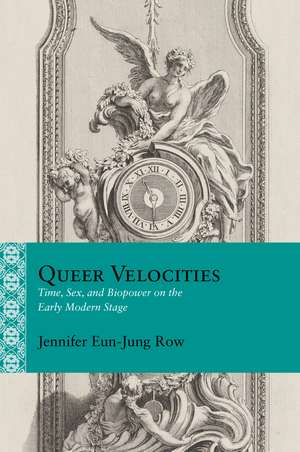Queer Velocities: Time, Sex, and Biopower on the Early Modern Stage: Rethinking the Early Modern
Autor Jennifer Eun-Jung Rowen Limba Engleză Paperback – 14 apr 2022
Queer Velocities: Time, Sex, and Biopower on the Early Modern Stage explores how seventeenth-century French theater represents queer desire. In this book, the first queer theoretical treatment of canonical French theater, Jennifer Eun-Jung Row proposes that these velocities, moments of unseemly haste or strategic delay, sparked new kinds of attachments, intimacies, and erotics. Rather than rely on fixed identities or analog categories, we might turn to these affectively saturated moments of temporal sensation to analyze queerness in the premodern world.
The twin innovations of precise, portable timepieces and the development of the theater as a state institution together ignited new types of embodiments, orderly and disorderly pleasures, and normative and wayward rhythms of life. Row leverages a painstakingly formalist and rhetorical analysis of tragedies by Jean Racine and Pierre Corneille to show how the staging of delay or haste can critically interrupt the normative temporalities of marriage, motherhood, mourning, or sovereignty—the quotidian rhythms and paradigms so necessary for the biopolitical management of life. Row’s approach builds on the queer turn to temporality and Elizabeth Freeman’s notion of the chronobiopolitical to wager that queerness can also be fostered by the sensations of disruptive speed and slowness. Ultimately, Row suggests that the theater not only contributed to the glitter of Louis XIV’s absolutist spectacle but also ignited new forms of knowing and feeling time, as well as new modes of loving, living, and being together.
The twin innovations of precise, portable timepieces and the development of the theater as a state institution together ignited new types of embodiments, orderly and disorderly pleasures, and normative and wayward rhythms of life. Row leverages a painstakingly formalist and rhetorical analysis of tragedies by Jean Racine and Pierre Corneille to show how the staging of delay or haste can critically interrupt the normative temporalities of marriage, motherhood, mourning, or sovereignty—the quotidian rhythms and paradigms so necessary for the biopolitical management of life. Row’s approach builds on the queer turn to temporality and Elizabeth Freeman’s notion of the chronobiopolitical to wager that queerness can also be fostered by the sensations of disruptive speed and slowness. Ultimately, Row suggests that the theater not only contributed to the glitter of Louis XIV’s absolutist spectacle but also ignited new forms of knowing and feeling time, as well as new modes of loving, living, and being together.
Preț: 304.94 lei
Nou
Puncte Express: 457
Preț estimativ în valută:
58.35€ • 61.25$ • 48.43£
58.35€ • 61.25$ • 48.43£
Carte indisponibilă temporar
Doresc să fiu notificat când acest titlu va fi disponibil:
Se trimite...
Preluare comenzi: 021 569.72.76
Specificații
ISBN-13: 9780810144705
ISBN-10: 0810144700
Pagini: 240
Dimensiuni: 152 x 229 x 15 mm
Greutate: 0.32 kg
Editura: Northwestern University Press
Colecția Northwestern University Press
Seria Rethinking the Early Modern
ISBN-10: 0810144700
Pagini: 240
Dimensiuni: 152 x 229 x 15 mm
Greutate: 0.32 kg
Editura: Northwestern University Press
Colecția Northwestern University Press
Seria Rethinking the Early Modern
Notă biografică
JENNIFER EUN-JUNG ROW is an assistant professor in the Department of French and Italian at the University of Minnesota.
Cuprins
Acknowledgements
Introduction: Queer Velocities
1. The Queer Disunity of Time, or the Affective Affordances of Le Cidy
2. Animate Ashes: The Time of Ruins and Remains in Andromaque
3. Polyeucte and the Speeds of Sects
4. Circling the Hymen: The Temporality of Dilation in Bérénice
Conclusion: Stepping Out of Time
Notes
Bibliography
Index
Introduction: Queer Velocities
1. The Queer Disunity of Time, or the Affective Affordances of Le Cidy
2. Animate Ashes: The Time of Ruins and Remains in Andromaque
3. Polyeucte and the Speeds of Sects
4. Circling the Hymen: The Temporality of Dilation in Bérénice
Conclusion: Stepping Out of Time
Notes
Bibliography
Index
Recenzii
“Queer Velocities makes significant contributions to multiple fields, first and foremost to early modern theater studies, but also and no less significantly to queer studies and to queer temporality studies. Jennifer Row displays brilliant theoretical creativity grounded in rigorous historical erudition.” —Lewis Seifert, author of Manning the Margins: Masculinity and Writing in Seventeenth-Century France
“It turns out that our understanding of the anti-normativity of queer time reflects twenty-first century assumptions about how time functions. With Queer Velocities, Row takes us back in time to early modern France when queer velocities operated as part of a temporal regime not yet solidified. In so doing, she contextualizes queer time through classical French tragedy as she brings out the temporal queerness of the early modern.” —Todd W. Reeser, author of Setting Plato Straight: Translating Ancient Sexuality in the Renaissance
“It turns out that our understanding of the anti-normativity of queer time reflects twenty-first century assumptions about how time functions. With Queer Velocities, Row takes us back in time to early modern France when queer velocities operated as part of a temporal regime not yet solidified. In so doing, she contextualizes queer time through classical French tragedy as she brings out the temporal queerness of the early modern.” —Todd W. Reeser, author of Setting Plato Straight: Translating Ancient Sexuality in the Renaissance
Descriere
This book explores the sensations of haste and delay as represented in seventeenth-century French theater. Jennifer Eun-Jung Row proposes that these disruptive velocities—occasions when the tempos of desire subverted society’s rhythms and norms—sparked new queer attachments and intimacies.














